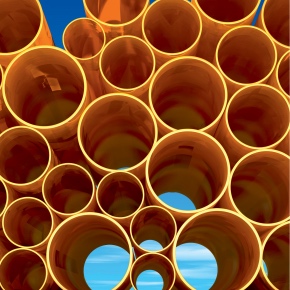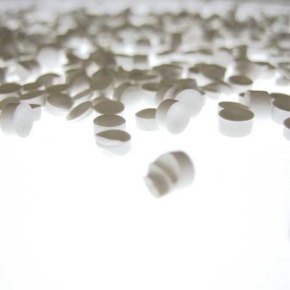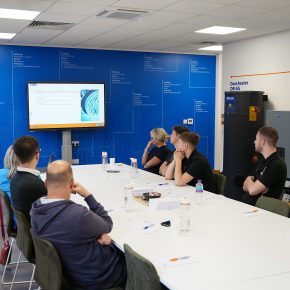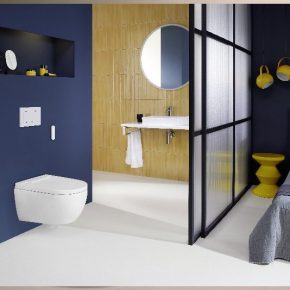
The benefits of using recycled polymers
Sophie Thomas, Director of design at the Royal Society for the encouragement of Arts, Manufactures and Commerce discusses the benefits of using recycled polymers from companies like Axion Polymers to ‘go green’.
The use of recycled plastics in new goods offers designers various environmental, economic and commercial benefits.
 As consumers are increasingly basing purchase decisions on a product’s sustainability, manufacturers, brand owners and retailers are focusing more on ethical principles to promote their brands and build customer loyalty.
As consumers are increasingly basing purchase decisions on a product’s sustainability, manufacturers, brand owners and retailers are focusing more on ethical principles to promote their brands and build customer loyalty.
Product designers and specifiers of materials are working towards sustainable product design in a move towards a circular economy in which resources are recovered at the end of each service life and reused in new products.
In order to achieve this, designers and specifiers of materials are challenging norms and habits and focusing the material supply chain to link up the circular loop and tap into the ready and growing supply of sustainable polymers coming from the innovative waste reprocessing sector.
The local authorities in the UK, the recycling industry and the wider supply chain have made significant improvement in working towards a circular economy for plastics and reusing these valuable resources.
 Raw material scarcity needs to be considered and recycling existing polymers ensures a sustainable and consistent supply for the future. Recycled polymers typically have about 50% to 75% of the carbon impact compared to taking oil out of the ground and creating a new polymer.
Raw material scarcity needs to be considered and recycling existing polymers ensures a sustainable and consistent supply for the future. Recycled polymers typically have about 50% to 75% of the carbon impact compared to taking oil out of the ground and creating a new polymer.
Recycled polymers are high quality and greatly available, allowing for a reliable and sustainable supply of locally sourced recovered materials.
End users that enter into a long-term supply agreement with an integrated recycling business, such as those in the end-of-life vehicle or construction products sectors, can benefit from a reliable local feedstock.
This shorter, lower risk supply chain from UK-based recyclate suppliers makes future production planning easier.
 In addition, recycled plastics can be recycled many times through a well-structured end of life re-supply chain.
In addition, recycled plastics can be recycled many times through a well-structured end of life re-supply chain.
Axion Polymers produces recycled plastics derived from end-of-life vehicles to make new automotive-related products. Axion Polymers are used in various industries, including water treatment, horticulture and retail goods.
Axion benefits from in-house technical expertise that recover and refine recycled materials from end-of-life vehicle shredder residue, providing a consistent product from a guaranteed feedstock supply.
Axion Polymers Director Keith Freegard says, “Creating new manufactured products using materials resources that are ‘mined’ from closed-loop recycling provides a novel and environmentally-responsible approach for vehicle producers that is both sustainable in the long term and also lower cost.”
PVC is suitable for use in building products with green credentials as it can be readily recycled many times with no loss of performance. VEKA Recycling processes post-industrial and post-consumer PVC window frame material to a high standard of purity at its Kent site.
VEKA Recycling Commercial Director Simon Scholes explains, “Recycled PVC offers clear advantages of reliable consistent supply and, of course, improves the environmental credentials of manufacturer’s products. In releasing the reliance on virgin polymers, we are giving longer life to plastic.”
Designers need to understand the design principles that enable the efficient release and recovery of materials during the recycling process. Equally, they should recognise the ‘black marks’ that apply to poorly designed products and wrong combinations of materials. Many everyday products have simple design-for-recycling guides, created by recyclers, which explain the ‘dos and don’ts’ of good design for recyclability.
Latest news

24th April 2024
Hamworthy Heating expands CIBSE approved CPD modules with new hot water series
Hamworthy Heating, technical experts in commercial heating and hot water products, announce the expansion of its market leading CIBSE approved Continuing Professional Development (CPD) portfolio with the launch of three new learning modules.
Posted in Articles, Building Industry Events, Building Industry News, Building Products & Structures, Building Services, Continuing Professional Development (CPD's), Facility Management & Building Services, Heating Systems, Controls and Management, Heating, Ventilation and Air Conditioning - HVAC, Plumbing, Retrofit & Renovation, Seminars, Training
24th April 2024
New technology partnership brings Passivent ventilation products to IESVE
Passivent has partnered with Integrated Environmental Solutions (IES) to make a number of its products available to model within the Virtual Environment (VE) platform IESVE.
Posted in Air Conditioning, Articles, Building Industry News, Building Products & Structures, Building Services, Facility Management & Building Services, Heating, Ventilation and Air Conditioning - HVAC, Information Technology, Innovations & New Products, Posts, Retrofit & Renovation, Roofs, Ventilation
23rd April 2024
Geberit brings Parallel World to Clerkenwell Design Week
Visitors to this year’s Clerkenwell Design Week (21 – 23 May) can step into a parallel world and discover the benefits of cleaning with water, thanks to Geberit.
Posted in Articles, Bathrooms & Toilets, Bathrooms, Bedrooms & Washrooms, Building Industry Events, Building Industry News, Building Products & Structures, Building Services, Exhibitions and Conferences, Innovations & New Products, Interior Design & Construction, Interiors, Plumbing, Restoration & Refurbishment, Retrofit & Renovation
23rd April 2024
Mitsubishi Electric Ecodan Heat Pumps and Water Cylinders to be stocked by The Boiler Shop
Mitsubishi Electric’s full range of Ecodan heat pumps and hot water cylinders are to be stocked by one of the north-west’s best established independent merchants, The Boiler Shop.
Posted in Articles, Building Industry News, Building Products & Structures, Building Services, Facility Management & Building Services, Heating Systems, Controls and Management, Heating, Ventilation and Air Conditioning - HVAC, Plumbing, Posts, Retrofit & Renovation, Sustainability & Energy Efficiency
 Sign up:
Sign up: